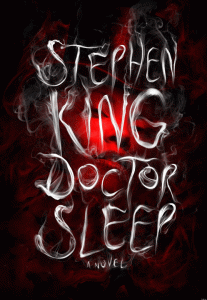
Book Review: Doctor Sleep by Stephen King
Words By Colin Griffith
It can be a strange thing, revisiting old stories. Though the text remains the same, perspective shifts around it, lending new wisdom to old characters or reminding us how the evils of the past never really fade.
Such is the core belief of Stephen King’s newest novel, Doctor Sleep. A sequel to his classic 1977 novel The Shining, this one finds King writing at the fulcrum between new thrills and old terror.
The novel begins with Dan Torrance—former inquisitive and semi-psychic haunting victim—wandering an aimless and drunken path through America, his adult life still tormented by his late alcoholic father and the demons that drove him to attempt murder upon his family. Though he finds solace in Alcoholics Anonymous and the hospice job where he uses his telepathic gift to ease residents into the next life, there is a kind of anxiety lurking beneath the surface of Dan’s life. Time and studious adherence to the tenets of AA have brought him to a point of tenuous balance with the skeletons in his mental closet, but reminders of his torment loom dark and bloody around the periphery.
Dan finds a kind of mental communion with Abra, a young girl whose shining makes Dan look like a failed reality TV medium. Her powers are both telepathic and kinetic: she knows when her beloved great-grandmother is ill, and the anguish of the fact sets off a mild earthquake at her family’s home. Here, too, King works in the confined space between the natural anxiety of adolescence and the altogether uncommon frustration of limiting one’s own power.
Meanwhile, Abra becomes target to the desires of a roving band of vampire-like wanderers called the True Knot, who live through centuries by feasting on the mental energy of kids like Abra, who expel their power as ‘steam’ at the moment of agonized death. For the Knot, Abra is more than a simple dish—she’s a smorgasbord, the kind of meal that makes normal humans languish on the couch for days. King renders these strange folks with almost unmarred villainy, giving them comedic names that play on their supernatural talents. Though we feel the urgency of their hunger and the terror of their subjects, these offbeat soul suckers never rise above basic depravity. We’re made to understand that they’re evil, and that’s all we get to know. Their interactions are lucid and their backstory intriguing, but it’s not hard to hate rich people who eat kids.
So if the villains aren’t particularly nuanced, King’s reimagining of his favorite trope—good vs. evil, meeting in battle—is as compelling as ever. Though King’s scope is wide, the novel works best when it focuses on our two protagonists. Doctor Sleep is an occasionally frustrating, sometimes mesmerizing piece of character development. We feel empathy for Abra’s struggle through the waters of adolescent self-discovery, only made more turbulent by the supernatural gift for which she never asked and the family who tries to understand it. Dan provides the novel’s shaky moral foreground, attempting to make good on his life’s shame while never forgetting the horror that bleeds through his memory.
Ultimately, it’s a novel about perspective—about looking back while moving forward. That’s really all any sequel can ask for.